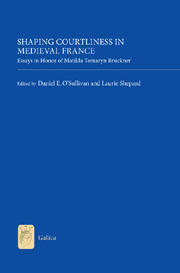Book contents
- Frontmatter
- Contents
- List of Illustrations
- Acknowledgements
- Introduction
- Matilda Tomaryn Bruckner: A Bibliography
- Part I Shaping Real and Fictive Courts
- Part II Shaping Courtly Narrative
- Part III Shaping Women's Voices in Medieval France
- Lombarda's Mirrors: Reflections on PC 288,1 as a Response 165 to PC 54,1
- Na Maria: Courtliness and Marian Devotion in Old Occitan Lyric
- From Convent to Court: Ermengarde d'Anjou's Decision to Reenter the World
- From Chrétien to Christine: Translating Twelfth-Century Literature to Reform the French Court during the Hundred Years War
- Part IV Shaping the Courtly Other
- Envoi
- List of Contributors
- Index
- Tabula Gratulatoria
- Already Published
Na Maria: Courtliness and Marian Devotion in Old Occitan Lyric
from Part III - Shaping Women's Voices in Medieval France
Published online by Cambridge University Press: 05 May 2013
- Frontmatter
- Contents
- List of Illustrations
- Acknowledgements
- Introduction
- Matilda Tomaryn Bruckner: A Bibliography
- Part I Shaping Real and Fictive Courts
- Part II Shaping Courtly Narrative
- Part III Shaping Women's Voices in Medieval France
- Lombarda's Mirrors: Reflections on PC 288,1 as a Response 165 to PC 54,1
- Na Maria: Courtliness and Marian Devotion in Old Occitan Lyric
- From Convent to Court: Ermengarde d'Anjou's Decision to Reenter the World
- From Chrétien to Christine: Translating Twelfth-Century Literature to Reform the French Court during the Hundred Years War
- Part IV Shaping the Courtly Other
- Envoi
- List of Contributors
- Index
- Tabula Gratulatoria
- Already Published
Summary
When I undertook a doctoral dissertation under the direction of Matilda Tomaryn Bruckner, a work that would become my first book, I had observed that the mere mention of the Virgin Mary or of Marian song elicited flat responses from critics, both alive and long gone. According to them, it was a foregone conclusion and therefore the end of analysis to say that Marian song in Old French was merely the product of substituting the Virgin Mary for the Lady of secular courtly song. Bruckner herself took on a similar problem of “flattening out” in her 1986 article, “Jaufré Rudel and Lyric Reception: The Problem of Abusive Generalization”:
Lured by the enigma of Jaufré's amor de lonh, many scholars have sought to explain or identify that elusive love and decipher (or invent) some satisfactory narrative that will account for, order, and classify the six poems of his corpus into a unified structure. The trouble is, such unity usually comes at the price of flattening out our appreciation of Jaufré's poetic variety, since most of these critical efforts, from the vida on, focus on the two poems of far-off love and consider the other songs as either buildup to or distraction from the poetic heights of amor de lonh.
- Type
- Chapter
- Information
- Shaping Courtliness in Medieval FranceEssays in Honor of Matilda Tomaryn Bruckner, pp. 183 - 200Publisher: Boydell & BrewerPrint publication year: 2013



